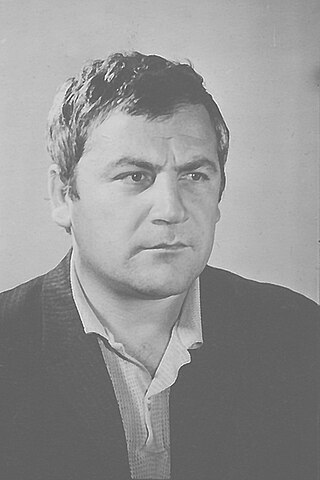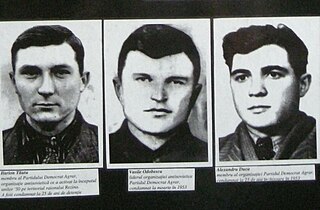The history of Moldova spans prehistoric cultures, ancient and medieval empires, and periods of foreign rule and modern independence.

The Moldavian Soviet Socialist Republic or Moldavian SSR, also known as the Moldovan Soviet Socialist Republic, Moldovan SSR, Soviet Moldavia, Soviet Moldova, or simply Moldavia or Moldova, was one of the 15 republics of the Soviet Union which existed from 1940 to 1991. The republic was formed on 2 August 1940 from parts of Bessarabia, a region annexed from Romania on 28 June of that year, and parts of the Moldavian Autonomous Soviet Socialist Republic, an autonomous Soviet republic within the Ukrainian SSR.

Moldovenism is a term used to describe the political support and promotion of a Moldovan identity and culture, including a Moldovan language, independent from those of any other ethnic group, the Romanians in particular. It is primarily used as a pejorative by the opponents of such ideas as part of the wider controversy over ethnic and linguistic identity in Moldova.

Ion Inculeț was a Bessarabian and Romanian politician, the President of the Country Council of the Moldavian Democratic Republic, Minister of the Interior of Romania, full member of the Romanian Academy.
The National Patriotic Front was a clandestine political party in the Moldovan SSR.
Valeriu Graur was a political dissident of Bessarabia, a member of the National Patriotic Front of Moldova.
The Freedom Party was a clandestine political party in the Moldovan SSR.
Multiple duplicate works stated, Works section generally unreadable/verbose. Needs general overall cleanup/CE
Ion Varta is an academic and politician from the Republic of Moldova.

Andrei Eșanu is a historian, writer and researcher from the Republic of Moldova. He is a member of the Commission for the Study of the Communist Dictatorship in Moldova. He is part of the Academy of Sciences of Moldova, and was elected an honorary member of the Romanian Academy in 2011.
Anatol Petrencu is a politician, historian and academic from the Republic of Moldova. In 1990-1992 he was the dean of the Faculty of History of the State University of Moldova, and between 1998 and 2006 he was president of the Association of Historians of Moldova. Between 2006 and 2010 he was the president of the European Action Movement party. Since October 2010 he has been the director of the Institute of Social History "ProMemoria". Vice President of the Liberal Party.
Vasile Bahnaru was a Moldovan philologist.

Chișinău has a recorded history that goes back to 1436. Since then, it has grown to become a significant political and cultural capital of South East Europe. In 1918 Chișinău became the capital of an independent state, the Moldavian Democratic Republic, and has been the capital of Moldova since 1991.
Ion Moraru was a Moldovan activist and author. He was a founder of the anti-Soviet group Sabia Dreptății and a political prisoner in the Soviet Union.

Dumitru Matcovschi was a writer from Moldova who was a member of the Academy of Sciences of Moldova. He was a founder of the Popular Front of Moldova.

Serafim Saca was a writer from Moldova. He is credited with being the author and director of several documentaries including House with Flowers (1965), Chișinău – 67 (1967), and Cross-Roads (1967). He became a member of the Moldovan Writers' Union in 1966. He was forbidden to publish between 1976 and 1987.
Valentin Mândâcanu was a writer and politician from Republic of Moldova.

Vasile Odobescu was a founder and leader of the anti-Soviet organization Democratic Agrarian Party.
The Democratic Forum of the Romanians of Moldova is a civic movement, which brings together over 120 NGOs, several leading public organizations of Moldova and a whole number of academicians, writers, journalists. In 2006, the organization claimed 100,000 members.








